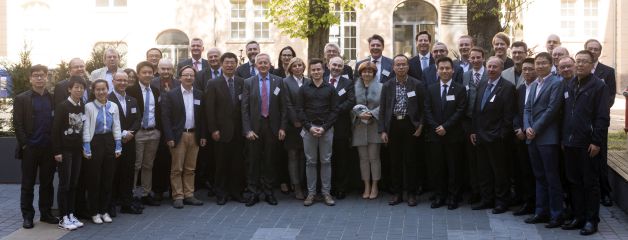Workshop on the sustainable use of domestic carbon resources
Technology development can contribute significantly to an efficient and environmentally friendly use of domestic carbon resources. This is the result of a two-day workshop with participants from China, Poland, the Czech Republic and Germany, which took place at the invitation of the Fraunhofer Institute for Microstructure of Materials and Systems IMWS in Berlin. Experts from science and industry discussed the potential of the hydrogen economy for a competitive and sustainable chemical industry or new catalysis technologies. They decided to intensify the mutual exchange.

With workshops in Zabrze / Poland (2017) and Dresden (2018), the Fraunhofer IMWS has already been involved in enhancing the international exchange on the possibilities of a carbon cycle economy and also initiated the formation of a European network. For the first time, the expertise of representatives from China was included in the workshop in Berlin, among others by speakers from the Shanghai Advanced Research Institute, Chinese Academy of Sciences (SARI CAS).
"How can we use the valuable domestic carbon resources efficiently - as building blocks of a climate-friendly circular economy? This is a crucial question for regions in Germany, but also in China, Poland and the Czech Republic," says Prof. Ralf B. Wehrspohn, head of the Fraunhofer Institute for Microstructure of Materials and Systems IMWS in Halle (Saale), who had invited the international guests to the Fraunhofer Forum in Berlin. "If you want to avoid releasing emissions from fossil resources, there are two ways: either you can reduce the rate of industrialization. Or you can resolutely focus on innovative technologies and develop them quickly in the direction of market readiness. We agree that the second way is the right one.«
In three sessions, an analysis of the current situation in the four countries as well as a discussion of innovative technological approaches in industry and science was carried out. The use of green hydrogen for energy storage and as raw material for the chemical industry was presented, as well as the potential for the use of carbon carriers for the production of synthesis gas. Other topics included electrolysis at medium temperatures between 100 and 700 ° C and the storage of electrical energy in zinc-air batteries.
The contributions of the European speakers made it clear that climate policy in particular is a decisive factor: The changing national and European framework caused uncertainty on the market, which impedes the development of new technologies by companies. Above all, Germany, which has agreed upon an ambitious plan to cut coal emissions, must find answers for a secure and affordable energy supply and a globally competitive chemical industry, showed the discussions of the participants.
Experts from China presented new ways of catalysis that can convert carbon dioxide or syngas directly into olefins or methanol. For instance, the carbon from waste, which was previously converted into a synthesis gas, can be recycled again via these synthesis routes. A technical process that could effectively use this technique would have great potential, in particular for the recovery of carbonaceous waste such as plastic waste in Europe, and would enable a genuine circular economy.
A panel discussion defined the most important fields of action for an efficient carbon cycle economy. It is important, therefore, to accelerate technology development in order to quickly create marketable solutions that can keep up with the regulatory measures to reduce CO2 emissions. A long-term research policy at national and European level with a vision for the next 30 to 50 years is needed to establish the key components of a carbon cycle economy, namely the generation and storage of electricity from renewable sources, green hydrogen and efficient recycling of carbonaceous waste.
The participants agreed to continue the exchange on these topics and to test and develop new approaches in joint projects as well. In June, a working group meeting will take place in Brussels at the invitation of Poland. The next workshop will take place in 2020 in Litvinov in the Czech Republic. The hosts will then be the lignite research center VUHU in Most and Unipetrol S.A.